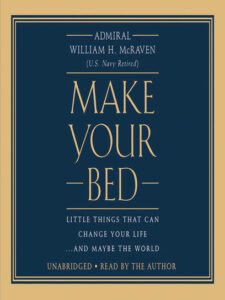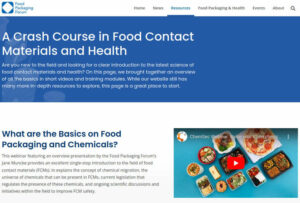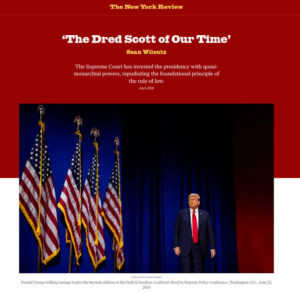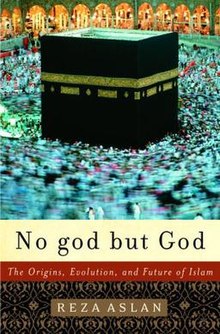This Week’s Selected Media, July 14, 2024: Make Your Bed, A course in packaging toxicity, The Dred Scott of Our Time, No god But God
This week I finished:

Make Your Bed: Little Things That Can Change Your Life…And Maybe the World, by Admiral William H. McRaven: I saw the video of McRaven’s commencement speech to the University of Texas years ago. It resonated with me because My sidchas, standard operating procedures, and preferences include waking up, making my bed, and crossing the room to turn off my alarm within sixty seconds.
Also, I had just finished the long book at the bottom of this page, No god But God, so wanted a short book. I finished this one in an afternoon.
I recommend it. Loosely, the structure was that he’d describe learning a lesson in Navy SEAL training, then how it applied in practice, often a life-or-death situation. It’s a lot about taking responsibility for your life. Not a book for people who want to be victims or want others to solve their problems.

A Crash Course in Food Contact Materials and Health, by the Food Packaging Forum: I’m preparing to bring the founder of the Food Packaging Forum to the podcast so watched the videos of this course on toxicity in the materials touching packaged food. What the course describes is horrendous.
That we’ve sleepwalked into such a disaster of our creation should be enough to lead us to stop it, but we’ve made our culture the opposite of what McRaven promotes, not that he’s taking responsibility to act on sustainability leadership, as far as I know.
I’d overlook that topics as yet more problems I can’t immediately do anything about, but they cover the food we eat. You can’t get more intimate.
The video topics:
- What are the Basics on Food Packaging and Chemicals?
- Food packaging is safe, right?
- Are low levels of chemicals in food packaging safe?
- All chemicals that could transfer from packaging into food are well known, right?
- Reduce, reuse, recycle: when it comes to dealing with food packaging waste, it’s that simple, right?
- What about recycled materials? Are some inherently safer?

The Dred Scott of Our Time, by Sean Wilentz: Usually I don’t put articles here, but this one resonated with me, especially as I’m learning about the development and passage of the Thirteenth Amendment. Also, I’ve emailed with Wilentz to invite him to the podcast, though it hasn’t happened yet.
The article begins:
The majority opinion in Trump v. United States, the most sweeping judicial reconstruction of the American presidency in history, secures the monumental historic disgrace of the John Roberts Court. Since last winter, the Supreme Court has intervened directly in the 2024 presidential campaign by effectively shielding Donald Trump from being tried on major federal charges before the November election. No previous Supreme Court has protected a political candidate in this way. Far more ominously, in March the Court in Trump v. Anderson openly nullified the section of the Fourteenth Amendment that bars insurrectionists from holding federal or state office, discarding basic lessons about threats to American democracy dating back to the Civil War. Now, in Trump v. United States, handed down on the last day of its 2023–2024 term, the Court has seized the opportunity to invent, with no textual basis, “at least presumptive” and quite possibly “absolute” presidential criminal immunity for official acts, a decision so broad that it essentially places the presidency above the law.
By throwing Trump’s federal indictments into doubt, Trump v. United States all but completes the former president’s immunization from legal accountability for the events of January 6, 2021, at least until after the election. But that is only the decision’s narrowest ambit. Its vague distinction between official and unofficial presidential acts gives any president carte blanche to commit crimes up to and including assassination and treason with virtual impunity from criminal prosecution, as long as he can justify those crimes as part of his “official” duties. In effect it invests the presidency with quasi-monarchial powers, repudiating the foundational principle of the rule of law. Trump and his supporters have pledged to wield unfettered executive power and unleash a scorched-earth assault on the “deep state,” which is to say the existing constitutional and institutional order, if he is reelected. In the current crisis, that threat’s most powerful ally is the Supreme Court of the United States.
The Roberts Court has descended to a level of shame reserved until now for the Roger B. Taney Court that decided the case of Dred Scott v. Sandford in 1857. Just as that court’s majority sought to suppress the antislavery Republican Party and to help permanently secure the Slave Power’s control over American law and government, so the Roberts Court majority has sought, thus far successfully, to protect Trump from prosecution and to secure radical changes in American law friendly to MAGA authoritarianism. The Supreme Court has once again willfully placed itself at the center of a presidential election on which the future of American democracy turns.
Another part that resonated with me (my emphasis):
Here the Court majority took a position similar to the one Justice Alito took during oral arguments. It is a position that reflects little faith in (or simply disregards) the protections afforded criminal defendants as opposed to civil action defendants, beginning with the requirement that the prosecution gather sufficient evidence to convince a grand jury to indict. It also weighs the necessity of broad executive authority as more important than the public interest; indeed, it equates the public interest with the need to immunize the president from criminal prosecution, so that the president can do whatever he thinks he needs to do. This is the essence of authoritarianism.
It closes:
The Roberts Court … has radically changed the very structure of American government, paving the way for MAGA authoritarianism just as the Taney Court tried to pave the way for enshrining the Slave Power.
All of which makes Trump v. United States the Dred Scott of our time.

No God but God: The Origins, Evolution, and Future of Islam, by Reza Aslan: I found this book at the library, realized I didn’t know much about Islam, saw it got amazing reviews and awards, so borrowed it. It’s long, so I didn’t finish it before it was due and someone else put a hold on it, so I had to return it, wait for them to finish, and finish it later.
The book gives a lot of history of the religion, its growth, and its interaction with other religions and cultures. The background was somewhat useful, but it reminded me of a saying I learned, “to learn one religion takes a lifetime. To learn a second takes two weeks,” though I can’t remember the source.
At the highest level, the religion seems as imperialist as Judaism and Christianity. All three seem the victors of competition among many empires competing around the fertile crescent, all resulting from cultures living unsustainably, requiring them to take from others the resources they exhaust. A culture taking another’s resources is imperialism. Taking their land is colonialism. Taking their labor is slavery. Again, these religions emerged from this pattern.
Aslan’s approach to the many interpretations and implementations of Islam reminded me of what the guy who started the Vipassana meditation centers where I did my ten-day retreats, Goenka. He kept saying there are many sects of Buddhism, but his is the root. In my opinion, you can tell something is not the root when they say something like that claim. No one says, “my version isn’t genuine.” Everyone says their interpretation is the most genuine.
Aslan seems to describe all the interpretations he disagrees with as misinterpretations destined to fade. I read his book as a literary apology (From Bittanica: apology, autobiographical form in which a defense is the framework for a discussion by the author of his personal beliefs and viewpoints). I guess I’m glad I read it to learn about a big part of my world I didn’t know enough about, but found Aslan’s defensiveness uncompelling.
Read my weekly newsletter

On initiative, leadership, the environment, and burpees
2 responses on “This Week’s Selected Media, July 14, 2024: Make Your Bed, A course in packaging toxicity, The Dred Scott of Our Time, No god But God”